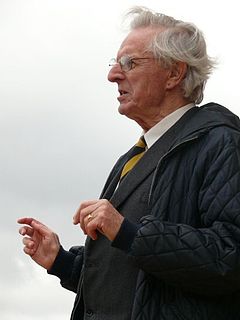
Sir Arnold Whittaker Wolfendale FRS was a British astronomer who served as the fourteenth Astronomer Royal from 1991 to 1995. He was Professor of Physics at Durham University from 1965 until 1992 and served as president of the European Physical Society (1999–2001). He was President of the Royal Astronomical Society from 1981-83.
James Douglas Grant Dunn, also known as Jimmy Dunn, was a British New Testament scholar, who was for many years the Lightfoot Professor of Divinity in the Department of Theology at the University of Durham. He worked broadly within the Methodist tradition and was a member of the Church of Scotland and the Methodist Church of Great Britain during his life.

The Shorthorn breed of cattle originated in the North East of England in the late eighteenth century. The breed was developed as dual-purpose, suitable for both dairy and beef production; however, certain blood lines within the breed always emphasised one quality or the other. Over time, these different lines diverged, and by the second half of the twentieth century, two separate breeds had developed – the Beef Shorthorn, and the Milking Shorthorn. All Shorthorn cattle are coloured red, white, or roan, although roan cattle are preferred by some, and completely white animals are not common. However, one type of Shorthorn has been bred to be consistently white – the Whitebred Shorthorn, which was developed to cross with black Galloway cattle to produce a popular blue roan crossbreed, the Blue Grey.
Michael M. J. Fischer is Andrew W. Mellon Professor in the Humanities and Professor of Anthropology and Science and Technology Studies at the Massachusetts Institute of Technology, and Lecturer in the Department of Global Health and Social Medicine, Harvard Medical School.

The Bishop of Durham is the Anglican bishop responsible for the Diocese of Durham in the Province of York. The diocese is one of the oldest in England and its bishop is a member of the House of Lords. Paul Butler has been the Bishop of Durham since his election was confirmed at York Minster on 20 January 2014. The previous bishop was Justin Welby, now Archbishop of Canterbury. The bishop is one of two who escort the sovereign at the coronation.
A professional degree, formerly known in the US as a first professional degree, is a degree that prepares someone to work in a particular profession, practice, or industry sector often meeting the academic requirements for licensure or accreditation. Professional degrees may be either graduate or undergraduate entry, depending on the profession concerned and the country, and may be classified as bachelor's, master's, or doctoral degrees. For a variety of reasons, professional degrees may bear the name of a different level of qualification from their classification in qualifications, e.g., some UK professional degrees are named bachelor's but are at master's level, while some Australian and Canadian professional degrees have the name "doctor" but are classified as master's or bachelor's degrees.

John Fendall Jr., also known as John of Java and Bengal, was a colonial official in the British East India Company and governor of Java for five months in 1816 before it was returned to the Netherlands.
GuthredHardacnutsson was the Christian king of Viking Northumbria from circa 883 until his death.
David William Rhind is a British geographer and expert on geographic information systems (GIS). He was Vice-Chancellor of City University, London, until July 2007.
The Lightfoot Professor of Divinity is a professorship or chair in the Department of Theology and Religion at Durham University. The chair is named after the former Bishop of Durham J. B. Lightfoot. The current holder is John M. G. Barclay.

The Durham University Observatory is a weather observatory owned and operated by the University of Durham. It is a Grade II listed building located at Potters Bank, Durham and was founded in 1839 initially as an astronomical and meteorological observatory by Temple Chevallier, until 1937 when the observatory moved purely to meteorological recording.
Bolde Phediche is a village development committee in Kabhrepalanchok District in Bagmati Province of central Nepal. At the time of the 1991 Nepal census it had a population of 2,324 and had 418 houses in it.
Samuel Bolde (1649–1737) was an English clergyman and controversialist, a supporter of the arguments of John Locke for religious toleration.
Durham Energy Institute (DEI) is a research institute located within Durham University. It was launched in September 2009 in order to undertake multi-disciplinary cutting-edge research into: energy technology and society. The current Executive Director is Professor Jon Gluyas.

James Bowstead (1801–1843) was an Anglican clergyman who served in the Church of England as the Bishop of Sodor and Man (1838–1840) and Bishop of Lichfield (1840–1843).
Henry Bridgeman was an Anglican clergyman who served in the Church of England as the Bishop of Sodor and Man from 1671 to 1682.

Neal Pollock is a Canadian academic and diver. Born in Edmonton, Canada he completed a bachelor's degree in zoology; the first three years at University of Alberta and the final year at the University of British Columbia. After completing a master's degree he then served as diving officer at University of British Columbia for almost five years. He then moved to Florida and completed a doctorate in exercise physiology/environmental physiology at Florida State University.

Heathery Burn Cave is a cave near Stanhope, County Durham, England, in which a large collection of Late Bronze Age weapons and tools was discovered and excavated between 1859 and 1872.
This page is based on this
Wikipedia article Text is available under the
CC BY-SA 4.0 license; additional terms may apply.
Images, videos and audio are available under their respective licenses.







